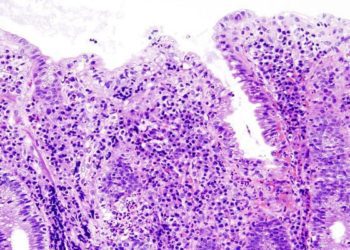Influenza vaccine safe for IBD patients
Image: PD
1. No connection was found between influenza immunization and health service utilization among pediatric Irritable Bowel Disease (IBD) patients.
2. Only 25.3% of IBD patients received the vaccine during the study period despite international guidelines supporting influenza immunization.
Evidence Rating Level: 3 (Fair)
Study Rundown: IBD therapy frequently causes immunosuppression in children. While international guidelines recommend that immunocompromised children receive a yearly influenza immunization, recent observational reports have raised concern of increased adverse effects when immunizing this population. In the current study, researchers aimed to evaluate the safety and rate of influenza vaccination among pediatric IBD patients. The data showed no correlation between the vaccine and increased healthcare visits including hospitalizations and emergency department (ED) or physician office visits for any reason. The number of healthcare visits was significantly lower for IBD patients 15-30 days after immunization, suggesting a protective effect of the vaccination. Immunization coverage was low study-wide with only a small percentage of the IBD and control patient populations receiving the vaccine yearly. This study may have been limited by an underestimation of vaccination rates, but the lack of healthcare service use increases and possible protective effects of vaccination indicate that immunization should be encouraged in this population.
Click to read the study, published today in Pediatrics
Relevant Reading: Guidelines for immunizations in patients with inflammatory bowel disease
In-Depth [case-control study]: Investigators gathered data from the Ontario Crohn’s and Colitis Cohort from 1994-2011. A total of 4,916 children with IBD and 21,686 patients without IBD were included in the assessment of influenza vaccination safety and administration rate. Safety of the vaccine was assessed by evaluating health service utilization through hospitalization, ED, and physician office visits in the 6 month period after vaccine administration. Significantly lower IBD-related health service utilization was seen in the studied postvaccine period when compared to the control group (RI: 0.81; p = .014). From days 15-30 there was a significant decrease in healthcare service utilization compared with controls during the same period (RI: 0.45; p = .006). Significantly more IBD patients received vaccinations compared to controls (25.3% vs. 13.2%, p < .001). Among all participants in the study, only 3.8% of IBD patients consistently received the vaccination yearly.
By Brandon Childs and Leah H. Carr
More from this author: Incidence of pediatric melanoma is increasing, X-ray after foreign body removal by esophagoscopy is not cost effective, Procalcitonin levels linked with acute pyelonephritis
© 2013 2minutemedicine.com. All rights reserved. No works may be reproduced without written consent from 2minutemedicine.com. Disclaimer: We present factual information directly from peer reviewed medical journals. No post should be construed as medical advice and is not intended as such by the authors or by 2minutemedicine.com. PLEASE SEE A HEALTHCARE PROVIDER IN YOUR AREA IF YOU SEEK MEDICAL ADVICE OF ANY SORT. Content is produced in accordance with fair use copyrights solely and strictly for the purpose of teaching, news and criticism. No benefit, monetary or otherwise, is realized by any participants or the owner of this domain.





